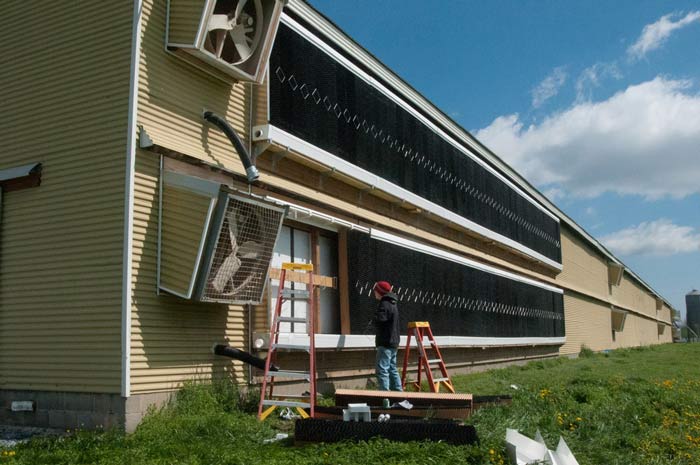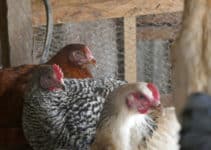Broiler Heat Stress Management, How To Effectively Manage it.
When it comes to effective broiler heat stress management. One of the keys to the success of poultry production is the provision of a conducive environment devoid of any severe stressors.
Stressors such as high environmental temperature could result in heat stress.
My birds are dying I just can’t explain what is happening. They look healthy they are not sick, they are all grown up, but they just kept dying.
These are the common words you hear from farmers especially broiler farmers experiencing death from heat stress, but can’t really figure out what is happening.
The situation above simple portend heat stress in poultry chicken: is a situation whereby birds have difficulty balancing body heat production and heat loss.
It is also a condition whereby chickens and other poultry birds experienced high temperatures.
Especially when combined with high relative humidity and low air circulation in their pen resulting in an unfavorable condition.
Poultry birds may tolerate temperatures below 35 0C over a certain period of time, but may not be able to tolerate it when it is higher than 40 to 45 0C.
Certain urgent measures have to be taken to minimize or reduce losses to the barest minimum.
READ also:
Broiler Farming, How to engage in profitable production.
Five (5) Solid Ways You Can Create Wealth through Poultry Farming
6 Important Lessons I Learned About Raising Noiler Chickens

For effective broiler heat, stress management overcrowded situations like this should be avoided by all means.
In Effective Broiler Heat Stress Management, What happens when the temperature becomes high
When temperatures become higher above 400C and temperature continues to increase the rate of panting increases concurrently.
Panting is a good way to release heat from the body by means of evaporation. But comes with the repercussion of loss of water, acids, and minerals leading to a condition called alkalosis.
these can result in electrolyte imbalance and dehydration.
During periods of heat stress, there is poor feed intake, leading to insufficient uptake of essential nutrients, vitamins, minerals, and amino acids.
If heat production becomes greater than maximum heat loss either in intensity or over a long period of time, birds begin to die very quickly.
The body temperature of the broiler must remain very close to at least 350C. If body temperature rises above 450C, deaths start to occur rapidly.
Recommended for READING:
The 5 Lessons I Learned In Poultry Production the Hard Way from My Twelve 12 Years of Farming
8 Things I Wish I Knew Before Starting Poultry Farming

Broiler under a crowded situation
Here are some signs to show you that your broilers birds need help from extreme heat:
- Broilers rest more during the period of heat stress. They perch close to walls or near their drinkers or waterers.
- Pants continuously in severe heat stress and gasping for breath is visible seen.
- Heat stress affects the immune system and the digestive system of the birds resulting in poor weight gain.
- They spread or lift their wings away from their body to promote cooling.
- Feed consumption reduces and water consumption rises as a result of high temperatures.
- In cases of extreme heat pale combs/wattles occur.

In combating broiler heat stress a good ventilation system that supplies fresh air to poultry farm is needed to provide a good living environment for healthier poultry and faster and more efficient growth.
How you can care for and combat broiler heat stress in broiler
- Clean, fresh, cool drinking water should be provided at all times between (10-120C) should be supplied, additional drinkers should be provided.
- As a good poultry farmer, you should be very observant, detect any visible abnormal discomfort in your poultry birds, for prompt action to ameliorate the situation.
- Where possible the automatic water supply is preferred to ensure a consistent water supply. The tank should be placed under a shade away from direct sunlight.
- Adequate ventilation should be provided for the birds, shades from tall trees and verandah will help to reduce direct exposure to sun rays in the afternoons.
- In extreme weather conditions, insulation materials should be installed in the poultry facility.
- Provide plenty of space for your birds. Reduce body heat by putting fewer birds in each house.
- Adequate ventilation, fans, air conditioning and/or cooling systems should be provided to aid proper air circulation within the poultry facility.
- Ensure proper litter management to reduce heat emanating from compost, and the removal of buildup ammonia, carbon dioxide, and moisture.
- The feed should be provided during the early hours of the day before the temperature starts rising between 6:00 am to 10:00 am and from 5:00 pm downwards this is very effective in reducing heat stress-related mortality in chicken especially broiler chicken.
- Laying hens should be fed in the late afternoon, and provide extra calcium, to facilitate egg formation during the night.

Providing a well-ventilated and spacious environment for your broiler birds is a good way of combating heat stress.
You might be interested in READING:
How to Ensure Good Hygiene and Bio-Security in Your Poultry Farm
Noiler Farming In Nigeria, the New Game Changer
6 Important Lessons I Learned About Raising Noiler Chickens
Other Measures to be Taken Ameliorate Broiler Heat Stress
- The use of vitamin C as an anti-stress agent should be considered seriously during the period of heat stress it can reduce stress conditions considerably.
- Maintain adequate electrolyte balance by providing a lot of vitamin supplements to help your birds combat heat stress.
- Keep your birds calm, don’t allow other pets to frighten them or disturb e.g dogs, cats, etc.
- Cleaning their pen or turning their litter should be done in the morning to reduce heat stress.

Birds under free-range system of farming have the luxury of choosing their environment.
Conclusion
Heat stress is a very difficult condition for farmers, especially broiler farmers that have their farms situated in hot and humid climatic conditions.
As a farmer, you cannot escape this season of the year, but by providing adequate facility, and a conducive production environment for your birds.
You will go a long way in curbing the losses that are usually associated with this season of the year.







No Responses